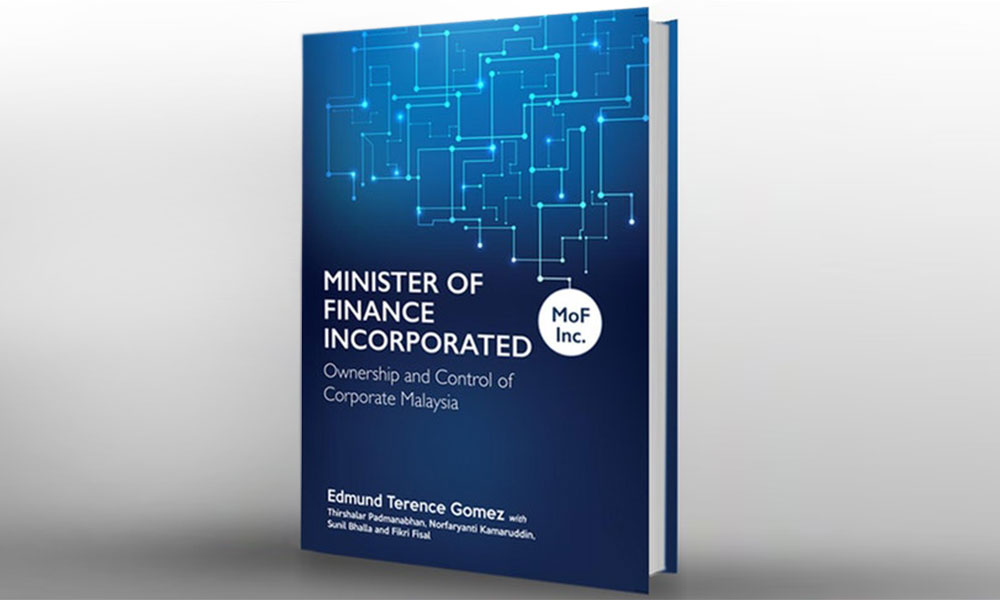BOOK REVIEW | Minister of Finance Incorporated: Ownership and Control of Corporate Malaysia. Edmund T Gomez et al. Institute for Democracy and Economic Affairs (IDEAS), Kuala Lumpur.
In the late 1980s, the young Terence Gomez proved himself to be the worthy successor to a Malaysian research tradition begun by James Puthucheary in Singapore’s Changi Prison almost three decades earlier. Gomez single-handedly transformed our understanding of the role of politics in the ownership and control of the Malaysian corporate sector.
Employing novel methods as needed and appropriate, the auto-didact researcher showed how official policies and institutions had enabled an earlier generation of selected Malay business professionals to take over some commanding heights of the Malaysian economy.
Change and continuity
In their new book, Gomez and his team of researchers chart developments over the last three decades since he began his pioneering work, paying particular attention to developments following the 1997-1998 crisis. That crisis exposed the vulnerability of the earlier expansion closely associated with the Umno leadership then.

The corporate restructuring and refinancing institutions and processes that followed were not simply bailouts at the public expense, as alleged by some critics then. Instead, as the book shows, most major assets are now under new management, ultimately controlled by the current prime minister cum finance minister.
The authors focus on seven government-linked investment companies (GLICs), namely Khazanah Nasional, Permodalan Nasional (PNB), both under MoF Inc, Kumpulan Wang Simpanan Pekerja (KWSP or EPF), Kumpulan Wang Persaraan (KWAP), Lembaga Tabung Angkatan Tentera (LTAT) and Tabung Haji.
Malaysians may be comforted to learn that of the seven, only Tabung Haji is run by politicians, and the others by professionals. But after all, 1MDB too has been run by professionals (Jho Low is a Wharton graduate) while Felda Global Venture’s previous boss claimed to have a doctorate. The not-so-magnificent seven covered do not include others, such as those in the Felda group, controlled directly by the PM since 2004.
Most bumiputera entrepreneurs who emerged in the dozen years or so before the 1997 crisis also had impressive professional credentials. The apparently better performance of the more recent crop of professional managers may have less to do with their qualifications, than the ethos, checks and balances of the new institutional arrangements introduced and enforced by some GLICs.
Government control
The range of activities undertaken by government-linked companies (GLCs) overseen by the GLICs includes familiar ones from the 1980s such as utilities, finance, plantations, property and construction. Media, previously controlled by the ruling party and its trustees, are now held by GLCs, while investments in hospitals and other services have also grown. With development finance institutions now under GLCs, their original objectives and rationales have been undermined by commercial considerations.
The Gomez team has done Malaysians a great service by describing how things have changed, tracing the bewildering variety of new arrangements. However, how to interpret this variety remains moot, and some informed readers will have their own bones to pick with what is considered most significant in their analysis.
Protracted crisis
Two economic developments help us better understand the recent growing unrest, especially among informed Malays. First, the Saudi-initiated oil price collapse in late 2014 precipitated a more general commodity price collapse. Meanwhile, lacklustre growth in Malaysia since 1998 has been exacerbated by premature deindustrialisation unconvincingly presented as inevitable in achieving developed country status.
Second, despite heavy censorship, news has been leaking out of corporate abuses involving not only 1MDB, but also FGV and other corporations associated with the legendary ‘Malaysian Official 1’. Easy money from China may have helped the regime with its immediate financing problems, but a generation familiar with mounting personal debt senses that this is at the public’s, taxpayers’ and future generations’ expense.
This ‘double whammy’ has been reflected in the much-weakened ringgit and by other indicators. Meanwhile, there have been heightened concerns about the recent foreign investor resurgence, especially with official non-disclosure of ownership data since 2008. Recent erosion of public faith in the state and ruling coalition has been accelerated by unprecedented recent abuses for personal gain and nepotism.
Don’t shoot the messenger
Even if successfully challenged on some details, this important book should open an important new debate on how Malaysia is to progress. Gomez offers some proposals, apparently at odds with the book’s sponsor. Others, especially participants in and observers of Malaysia’s corporate sector and political economy, will promote their own alternative purported solutions. The ensuing debate can only benefit the nation, as Gomez’s first decade of publications shaped the earlier debate and reforms, even if most outcomes may have disappointed him.
While this regime is undoubtedly associated with unprecedented abuses, there is little in the study to support the publisher’s faith in leaving things to the market and simplistic insistence on government withdrawal from the economy as a universal panacea to the myriad problems the nation faces. In the face of the wide-ranging and complex issues involved, this would be tantamount to throwing the baby out with the bathwater.
Unsurprisingly, this publication on the regime’s role in ownership and control of contemporary corporate Malaysia is silent on the current political crisis as the nation approaches the next general election. Nevertheless, IDEAs must be congratulated for sponsoring and publishing this important work.
JOMO KS received the 2007 Wassily Leontief Prize for Advancing the Frontiers of Economic Thought. The views expressed here are entirely his own.

